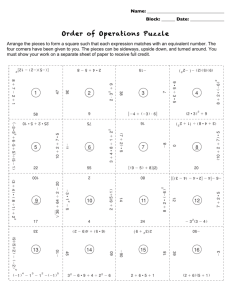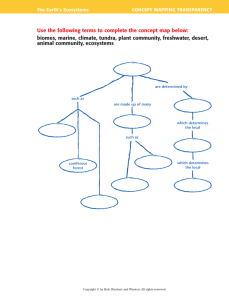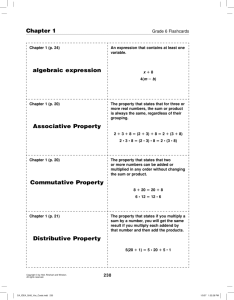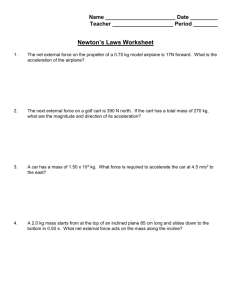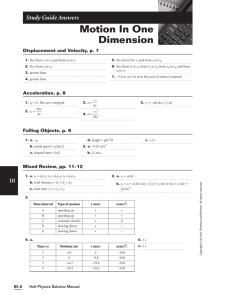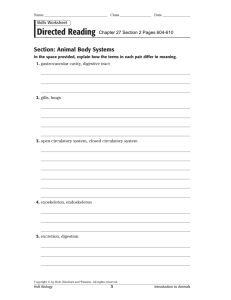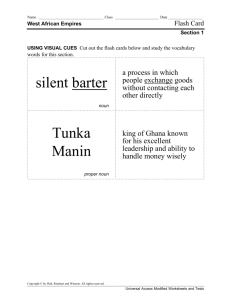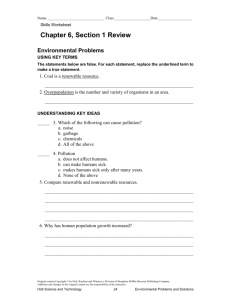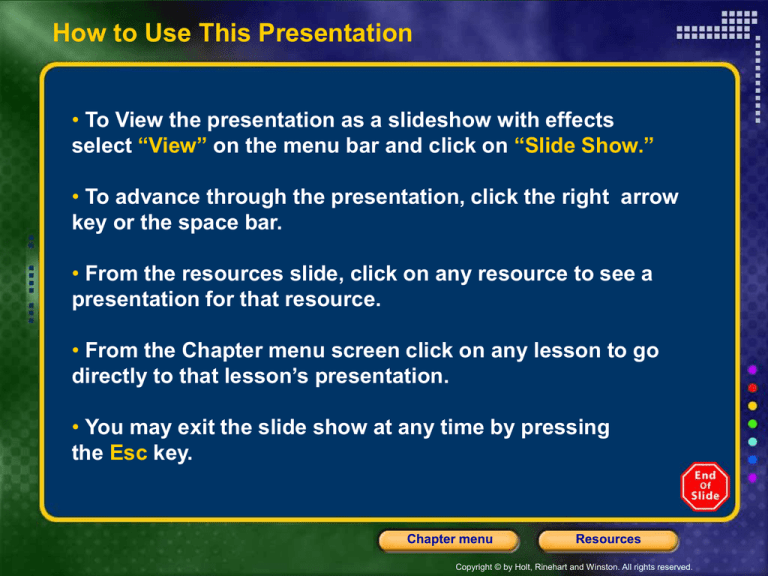
How to Use This Presentation
• To View the presentation as a slideshow with effects
select “View” on the menu bar and click on “Slide Show.”
• To advance through the presentation, click the right arrow
key or the space bar.
• From the resources slide, click on any resource to see a
presentation for that resource.
• From the Chapter menu screen click on any lesson to go
directly to that lesson’s presentation.
• You may exit the slide show at any time by pressing
the Esc key.
Chapter menu
Resources
Copyright © by Holt, Rinehart and Winston. All rights reserved.
Resources
Chapter Presentation
Image and Activity Bank
Transparencies
Brain Food Video Quiz
Bellringers
Quotes About Character
Chapter menu
Chapter
Resources
Menu
Copyright © by Holt, Rinehart and Winston. All rights reserved.
Quotes About Character
“To enjoy the things we ought and to hate
the things we ought has the greatest
bearing on excellence of character.”
—Aristotle
Chapter menu
Resources
Copyright © by Holt, Rinehart and Winston. All rights reserved.
Chapter 7
Nutrition for Life
Chapter menu
Resources
Copyright © by Holt, Rinehart and Winston. All rights reserved.
Chapter 7
Nutrition for Life
Contents
•
•
•
•
Section 1 Carbohydrates, Fats, and Proteins
Section 2 Vitamins, Minerals, and Water
Section 3 Meeting Your Nutritional Needs
Section 4 Choosing a Healthful Diet
Chapter menu
Resources
Copyright © by Holt, Rinehart and Winston. All rights reserved.
Chapter 7
Section 1 Carbohydrates, Fats, and
Proteins
Bellringer
• What does the phrase “You are what you eat” mean
to you?
Chapter menu
Resources
Copyright © by Holt, Rinehart and Winston. All rights reserved.
Chapter 7
Section 1 Carbohydrates, Fats, and
Proteins
Objectives
• Name the six classes of nutrients.
• Identify the functions and food sources of
carbohydrates, proteins, and fats.
• Describe the need for enough fiber in your diet.
• Identify one health disorder linked to high levels of
saturated fats in the diet.
• Describe how diet can influence health.
Chapter menu
Resources
Copyright © by Holt, Rinehart and Winston. All rights reserved.
Chapter 7
Section 1 Carbohydrates, Fats, and
Proteins
What is Nutrition?
• Nutrition is the science or study of food and the
ways the body uses food.
• Nutrients are substances in food that provide energy
or help form body tissues and are necessary for life
and growth.
Chapter menu
Resources
Copyright © by Holt, Rinehart and Winston. All rights reserved.
Chapter 7
Section 1 Carbohydrates, Fats, and
Proteins
What is Nutrition?
• Six Classes of Nutrients
1. Carbohydrates
2. Fats
3. Proteins
4. Vitamins
5. Minerals
6. Water
• A Balanced Diet To be healthy, you need the right
amount of nutrients from each class.
Chapter menu
Resources
Copyright © by Holt, Rinehart and Winston. All rights reserved.
Chapter 7
Section 1 Carbohydrates, Fats, and
Proteins
What is Nutrition?
• Metabolism is the sum of the chemical processes
that take place in your body to keep you alive and
active.
• Metabolism requires energy from carbohydrates,
fats, and proteins.
• The energy in food is measured in Calories.
Chapter menu
Resources
Copyright © by Holt, Rinehart and Winston. All rights reserved.
Chapter 7
Section 1 Carbohydrates, Fats, and
Proteins
What is Nutrition?
Chapter menu
Resources
Copyright © by Holt, Rinehart and Winston. All rights reserved.
Chapter 7
Section 1 Carbohydrates, Fats, and
Proteins
What is Nutrition?
• Carbohydrates are energy-giving nutrients that
include sugars, starches, and fiber.
• Fats are the main form of energy storage in the body.
• Proteins are made of amino acids, which build and
repair structures and regulate processes in the body.
Chapter menu
Resources
Copyright © by Holt, Rinehart and Winston. All rights reserved.
Chapter 7
Section 1 Carbohydrates, Fats, and
Proteins
Carbohydrates
• Carbohydrates are energy-giving nutrients that
include sugars, starches, and fiber.
• Sugars are the simplest form of carbohydrates.
• Starches are more complex carbohydrates that can
be broken down into sugars.
• Glycogen is a form of carbohydrate your body uses
for short-term energy storage.
• Fiber is a complex carbohydrate that provides little
energy and cannot be digested. However, fiber is
important to keep your digestive system healthy.
Chapter menu
Resources
Copyright © by Holt, Rinehart and Winston. All rights reserved.
Chapter 7
Section 1 Carbohydrates, Fats, and
Proteins
Carbohydrates
Chapter menu
Resources
Copyright © by Holt, Rinehart and Winston. All rights reserved.
Chapter 7
Section 1 Carbohydrates, Fats, and
Proteins
Fats
• Fats are the body’s main form of long-term energy
storage.
• Fats are large molecules made up of fatty acids and
glycerol.
• Fatty acids are long chains of carbon atoms
attached to hydrogen atoms.
• Fats are classified by the types of fatty acids they
contain.
Chapter menu
Resources
Copyright © by Holt, Rinehart and Winston. All rights reserved.
Chapter 7
Section 1 Carbohydrates, Fats, and
Proteins
Fats
• Saturated fats contain saturated fatty acids.
• A fatty acid is saturated when every carbon atom is
bonded to as many hydrogen atoms as possible.
• Saturated fats are usually solid at room temperature.
They come from foods such as meat and milk.
• Eating too many saturated fats can lead to obesity,
high cholesterol levels, and increased risk of heart
disease.
Chapter menu
Resources
Copyright © by Holt, Rinehart and Winston. All rights reserved.
Chapter 7
Section 1 Carbohydrates, Fats, and
Proteins
Fats
• Unsaturated fats contain unsaturated fatty acids.
• A fatty acid is unsaturated when the carbon atoms
are not bonded to as many hydrogen atoms as
possible.
• Saturated fats are usually liquid at room temperature.
They come from foods such as oils and fish.
Chapter menu
Resources
Copyright © by Holt, Rinehart and Winston. All rights reserved.
Chapter 7
Section 1 Carbohydrates, Fats, and
Proteins
Fats
• Cholesterol is another type of lipid found in all
human and animal tissues.
• Your body makes cholesterol. You also get
cholesterol from foods such as meat, eggs, and dairy
products.
• Cholesterol is necessary for certain essential
functions in the body.
• Too much of certain types of cholesterol in your diet
can cause deposits on blood vessel walls, increasing
the risk of heart attack.
Chapter menu
Resources
Copyright © by Holt, Rinehart and Winston. All rights reserved.
Chapter 7
Section 1 Carbohydrates, Fats, and
Proteins
Chapter menu
Resources
Copyright © by Holt, Rinehart and Winston. All rights reserved.
Chapter 7
Section 1 Carbohydrates, Fats, and
Proteins
Proteins
• Proteins are made of amino acids, which are used in
building and repairing structures in the body.
• Proteins are also needed for hormones, enzymes,
and other essential molecules.
• Essential amino acids are nine amino acids that the
body cannot produce on its own.
• Complete proteins are dietary proteins that contain
all the essential amino acids.
• Incomplete proteins do not contain all the essential
amino acids.
Chapter menu
Resources
Copyright © by Holt, Rinehart and Winston. All rights reserved.
Chapter 7
Section 2 Vitamins, Minerals, and
Water
Bellringer
• Write down the names of the vitamins and minerals
you have heard of. In what kinds of foods do you
think each of these would be found?
Chapter menu
Resources
Copyright © by Holt, Rinehart and Winston. All rights reserved.
Chapter 7
Section 2 Vitamins, Minerals, and
Water
Objectives
• Describe the function and food sources of seven
vitamins.
• Describe the function and food sources of seven
minerals.
• Identify the importance of drinking enough water
every day.
• Name two ways to increase your calcium intake.
Chapter menu
Resources
Copyright © by Holt, Rinehart and Winston. All rights reserved.
Chapter 7
Section 2 Vitamins, Minerals, and
Water
Vitamins
• Vitamins are carbon-containing nutrients that are
needed in small amounts to maintain health and
allow growth.
• Fat-soluble vitamins dissolve in fat. As a result,
they can be stored in fat tissue and remain in the
body for a long time.
• Water-soluble vitamins dissolve in water. They are
not stored in the body very well.
Chapter menu
Resources
Copyright © by Holt, Rinehart and Winston. All rights reserved.
Chapter 7
Section 2 Vitamins, Minerals, and
Water
Chapter menu
Resources
Copyright © by Holt, Rinehart and Winston. All rights reserved.
Chapter 7
Section 2 Vitamins, Minerals, and
Water
Chapter menu
Resources
Copyright © by Holt, Rinehart and Winston. All rights reserved.
Chapter 7
Section 2 Vitamins, Minerals, and
Water
Minerals
• Minerals are chemical elements that are essential in
small amounts to maintain good health.
• Nutrient deficiency is the state of not having
enough of a nutrient to maintain good health.
• Most of us eat more sodium than is healthy.
• Most teens do not eat enough calcium. Calcium is
found in green, leafy vegetables and in calciumfortified foods.
• Iron-deficiency is a worldwide problem that causes
anemia. Red meats are rich in iron.
Chapter menu
Resources
Copyright © by Holt, Rinehart and Winston. All rights reserved.
Chapter 7
Section 2 Vitamins, Minerals, and
Water
Chapter menu
Resources
Copyright © by Holt, Rinehart and Winston. All rights reserved.
Chapter 7
Section 2 Vitamins, Minerals, and
Water
Water
• About 60 percent of your body is water.
• Water is essential for almost every function that
keeps you alive.
• To be healthy, you should take in at least 2.5 quarts
of water each day (about 8 glasses). This makes up
for water lost through excretion and evaporation.
• Mild dehydration can interfere with mental and
physical performance.
• Severe dehydration can have very serious
consequences, including death.
Chapter menu
Resources
Copyright © by Holt, Rinehart and Winston. All rights reserved.
Chapter 7
Section 2 Vitamins, Minerals, and
Water
Chapter menu
Resources
Copyright © by Holt, Rinehart and Winston. All rights reserved.
Chapter 7
Section 3 Meeting Your Nutritional
Needs
Bellringer
• Plan a dinner menu based on your favorite meal.
Then use what you now know about nutrition to
improve the nutritional value of your meal.
Chapter menu
Resources
Copyright © by Holt, Rinehart and Winston. All rights reserved.
Chapter 7
Section 3 Meeting Your Nutritional
Needs
Objectives
• Describe what the Recommended Daily Allowances
(RDAs) are.
• Analyze the nutritional value of a food by using the
information on the food label.
• Identify the purpose of the Food Guide Pyramid and
identify foods from each of its food groups.
• Summarize the Dietary Guidelines for Americans.
• Determine whether your daily diet meets the Food
Guide Pyramid recommendations.
Chapter menu
Resources
Copyright © by Holt, Rinehart and Winston. All rights reserved.
Chapter 7
Section 3 Meeting Your Nutritional
Needs
How Much of Each Nutrient?
• Recommended Dietary Allowances (RDAs) are the
recommended nutrient intakes that will meet the
needs of most healthy people.
• RDAs are guidelines, not exact requirements.
Chapter menu
Resources
Copyright © by Holt, Rinehart and Winston. All rights reserved.
Chapter 7
Section 3 Meeting Your Nutritional
Needs
Understanding Food Labels
• Serving Size Nutrition labels show the size of a
single serving. All other values on the label are in
reference to this serving size.
• Calories Nutrition labels list total Calories, the
Calories from fat, and the Calories from saturated fat.
Chapter menu
Resources
Copyright © by Holt, Rinehart and Winston. All rights reserved.
Chapter 7
Section 3 Meeting Your Nutritional
Needs
Understanding Food Labels
• Daily Values (DVs) are recommended daily amounts
of nutrients.
• The percentage DV tells the amount of the nutrient in
a serving relative to the total recommended daily
amount for a 2000-Calorie diet.
Chapter menu
Resources
Copyright © by Holt, Rinehart and Winston. All rights reserved.
Chapter 7
Section 3 Meeting Your Nutritional
Needs
Understanding Other Terms on Food Packaging
• Food labels list ingredients in order of weight.
• Food labels also typically list the amount of
cholesterol, sugars, sodium, and protein per serving.
Chapter menu
Resources
Copyright © by Holt, Rinehart and Winston. All rights reserved.
Chapter 7
Section 3 Meeting Your Nutritional
Needs
The Food Guide Pyramid
• The Food Guide Pyramid is a visual and conceptual
tool for planning your diet.
• The pyramid shows the recommended number of
servings from each of six food groups.
Chapter menu
Resources
Copyright © by Holt, Rinehart and Winston. All rights reserved.
Chapter 7
Section 3 Meeting Your Nutritional
Needs
Chapter menu
Resources
Copyright © by Holt, Rinehart and Winston. All rights reserved.
Chapter 7
Section 3 Meeting Your Nutritional
Needs
Chapter menu
Resources
Copyright © by Holt, Rinehart and Winston. All rights reserved.
Chapter 7
Section 3 Meeting Your Nutritional
Needs
Dietary Guidelines for Americans
• The Dietary Guidelines for Americans are a set of
diet and lifestyle recommendations to improve health
in the United States.
• These guidelines are divided into three parts, known
as the “ABC’s for Good Health.”
• Aim for fitness.
• Build a healthy base.
• Choose sensibly.
Chapter menu
Resources
Copyright © by Holt, Rinehart and Winston. All rights reserved.
Chapter 7
Section 3 Meeting Your Nutritional
Needs
Dietary Guidelines for Americans
• Aim for Fitness
• Aim for a healthy weight.
• Be physically active each day.
• Build a Healthy Base
• Use the Food Guide Pyramid.
• Choose a variety of grains.
• Choose a variety of fruits and vegetables.
• Keep food safe.
Chapter menu
Resources
Copyright © by Holt, Rinehart and Winston. All rights reserved.
Chapter 7
Section 3 Meeting Your Nutritional
Needs
Dietary Guidelines for Americans
• Choose Sensibly
• Choose a diet low in saturated fat and
cholesterol.
• Choose food and drink to moderate sugar
intake.
• Choose and prepare foods with less salt.
• Adults who drink alcohol should do so in
moderation.
Chapter menu
Resources
Copyright © by Holt, Rinehart and Winston. All rights reserved.
Chapter 7
Section 4 Choosing a Healthful Diet
Bellringer
• List junk food items that you like to eat. What
healthier foods could you substitute for these foods?
Chapter menu
Resources
Copyright © by Holt, Rinehart and Winston. All rights reserved.
Chapter 7
Section 4 Choosing a Healthful Diet
Objectives
• Identify why certain foods are called junk foods.
• Describe examples of healthful snacks.
• Compare the dietary needs of infants, children,
teenagers, and adults.
• Describe the special dietary needs of athletes,
pregnant women, and people who are ill.
• Identify reasons why vegetarians need to carefully
plan their diet.
• Identify ways to reduce fat, sugar, and salt in your
diet.
Chapter menu
Resources
Copyright © by Holt, Rinehart and Winston. All rights reserved.
Chapter 7
Section 4 Choosing a Healthful Diet
Simple Steps to a More Healthful Diet
• Nutrient density is a measure of the nutrients in a
food compared with the energy the food provides.
• Food with low nutrient density is sometimes called
junk food.
• Eating junk food occasionally is OK, but you should
always aim for balance and moderation.
• You can make up for the nutrients missing in junk
food by eating healthier foods at other times of the
day.
Chapter menu
Resources
Copyright © by Holt, Rinehart and Winston. All rights reserved.
Chapter 7
Section 4 Choosing a Healthful Diet
Simple Steps to a More Healthful Diet
• Food prepared at home often has less fat and
sodium than food from fast-food restaurants.
• Eating snacks can be healthy if you choose to snack
on healthier foods.
• If you do eat low-nutrient snacks, make sure to
balance them out with healthy meals.
Chapter menu
Resources
Copyright © by Holt, Rinehart and Winston. All rights reserved.
Chapter 7
Section 4 Choosing a Healthful Diet
Nutrition Throughout Life
• Infants who are fed breast milk or formula get the
right mix of nutrients, Calories, and other substances
necessary for growth and protection from infection.
• An infant’s diet is high in fat to provide energy for
rapid growth and brain development.
• The nutritional needs of children over 2 can be met
by following the Food Guide Pyramid, but with
smaller serving sizes.
Chapter menu
Resources
Copyright © by Holt, Rinehart and Winston. All rights reserved.
Chapter 7
Section 4 Choosing a Healthful Diet
Nutrition Throughout Life
• During the teen years, the body grows and changes
rapidly.
• Adolescent boys should use the high end of the
serving ranges on the Food Guide Pyramid.
Adolescent girls should use the middle of the ranges.
Chapter menu
Resources
Copyright © by Holt, Rinehart and Winston. All rights reserved.
Chapter 7
Section 4 Choosing a Healthful Diet
Nutrition Throughout Life
• Teens should make sure to meet nutrient needs
without exceeding energy needs.
• Because adults grow less and are less active than
teens, they need fewer Calories per day. Adults must
still make sure their nutrient needs are met.
Chapter menu
Resources
Copyright © by Holt, Rinehart and Winston. All rights reserved.
Chapter 7
Section 4 Choosing a Healthful Diet
Special Dietary Needs
• Athletes must drink lots of fluids and avoid
dehydration.
• Athletes need a diet high in carbohydrates for extra
energy.
• Most athletes do not need extra protein in their diets.
Chapter menu
Resources
Copyright © by Holt, Rinehart and Winston. All rights reserved.
Chapter 7
Section 4 Choosing a Healthful Diet
Special Dietary Needs
• Athletes do not need dietary supplements to improve
performance. In fact, these supplements can be
dangerous.
• If you take a dietary supplement, do not exceed the
Tolerable Upper Intake Limit for any nutrient.
Chapter menu
Resources
Copyright © by Holt, Rinehart and Winston. All rights reserved.
Chapter 7
Section 4 Choosing a Healthful Diet
Special Dietary Needs
• Pregnant women need up to an additional 450
Calories per day.
• Pregnant women also need additional protein, B
vitamins, folate, iron, and zinc.
• If you have a cold, flu, or other mild illness, drink
plenty of fluids.
• If you have a chronic or long-term illness, you must
make sure your diet gives you enough energy and
the proper nutrients to fight the illness.
Chapter menu
Resources
Copyright © by Holt, Rinehart and Winston. All rights reserved.
Chapter 7
Section 4 Choosing a Healthful Diet
Choosing a Vegetarian Diet
• A vegetarian diet is one in which few or no animal
products are eaten.
• Vegans are vegetarians that eat no animal products
in any form.
• Most vegetarians get all the proteins they need from
the small amounts of animal products they eat.
• Vegans must eat from a variety of plant sources to
get all the essential amino acids and other important
nutrients.
Chapter menu
Resources
Copyright © by Holt, Rinehart and Winston. All rights reserved.
Brain Food Video Quiz
Click below to watch the Brain Food Video Quiz that
accompanies this chapter.
Brain Food Video Quiz
You may stop the video at any time by pressing
the Esc key.
Chapter menu
Resources
Copyright © by Holt, Rinehart and Winston. All rights reserved.
End of Chapter 7 Show
Chapter menu
Resources
Copyright © by Holt, Rinehart and Winston. All rights reserved.
Chapter 7
Section 1 Carbohydrates, Fats, and
Proteins
Carbohydrates
Chapter menu
Resources
Copyright © by Holt, Rinehart and Winston. All rights reserved.
Chapter 7
Section 1 Carbohydrates, Fats, and
Proteins
Chapter menu
Resources
Copyright © by Holt, Rinehart and Winston. All rights reserved.
Quotes About Character
“If you stand straight, do not fear a crooked
shadow.”
—Chinese Proverb
Chapter menu
Resources
Copyright © by Holt, Rinehart and Winston. All rights reserved.
Quotes About Character
“One falsehood spoils a thousand truths.”
—African Proverb
Chapter menu
Resources
Copyright © by Holt, Rinehart and Winston. All rights reserved.
Quotes About Character
“A man cannot be comfortable without his
own approval.”
—Mark Twain
Chapter menu
Resources
Copyright © by Holt, Rinehart and Winston. All rights reserved.
Quotes About Character
“Our reverence is good for nothing if it does
not begin with self-respect.”
—Oliver Wendell Holmes
Chapter menu
Resources
Copyright © by Holt, Rinehart and Winston. All rights reserved.
Quotes About Character
“When the character of a man is not clear to
you, look at his friends.”
—Japanese Proverb
Chapter menu
Resources
Copyright © by Holt, Rinehart and Winston. All rights reserved.
Quotes About Character
“What lies behind us and what lies before
us are small matters compared to what lies
within us.”
—Ralph Waldo Emerson
Chapter menu
Resources
Copyright © by Holt, Rinehart and Winston. All rights reserved.
Quotes About Character
“A good name, like good will, is got by
many actions and lost by one.”
—Lord Jeffrey
Chapter menu
Resources
Copyright © by Holt, Rinehart and Winston. All rights reserved.
Quotes About Character
“To enjoy the things we ought and to hate
the things we ought has the greatest
bearing on excellence of character.”
—Aristotle
Chapter menu
Resources
Copyright © by Holt, Rinehart and Winston. All rights reserved.
Quotes About Character
“He that respects himself is safe from
others; He wears a coat of mail that none
can pierce.”
—Henry Wadsworth Longfellow
Chapter menu
Resources
Copyright © by Holt, Rinehart and Winston. All rights reserved.
Quotes About Character
“The reputation of a thousand years may be
determined by the conduct of one hour.”
—Japanese Proverb
Chapter menu
Resources
Copyright © by Holt, Rinehart and Winston. All rights reserved.
Quotes About Character
“Dreams are the touchstones of our
character.”
—Henry David Thoreau
Chapter menu
Resources
Copyright © by Holt, Rinehart and Winston. All rights reserved.
Quotes About Character
“A man’s character is his fate.”
—Heraclitus
Chapter menu
Resources
Copyright © by Holt, Rinehart and Winston. All rights reserved.
Quotes About Character
“Character is that which reveals moral
purpose, exposing the class of things a
man chooses and avoids.”
—Aristotle
Chapter menu
Resources
Copyright © by Holt, Rinehart and Winston. All rights reserved.
Quotes About Character
“What you do speaks so loud that I cannot
hear what you say.”
—Ralph Waldo Emerson
Chapter menu
Resources
Copyright © by Holt, Rinehart and Winston. All rights reserved.
Quotes About Character
“Abstinence is the surety of temperance.”
—Plato
Chapter menu
Resources
Copyright © by Holt, Rinehart and Winston. All rights reserved.
Quotes About Character
“This above all, to thine own self be
true/And it must follow, as the night the day/
Thou canst not then be false to any man.”
—William Shakespeare
Chapter menu
Resources
Copyright © by Holt, Rinehart and Winston. All rights reserved.
Quotes About Character
“No change of circumstances can repair a
defect of character .”
—Ralph Waldo Emerson
Chapter menu
Resources
Copyright © by Holt, Rinehart and Winston. All rights reserved.
Quotes About Character
“Men acquire a particular quality by
constantly acting a particular way . . . you
become just by performing just actions,
temperate by performing temperate actions,
brave by performing brave actions.”
—Aristotle
Chapter menu
Resources
Copyright © by Holt, Rinehart and Winston. All rights reserved.
Quotes About Character
“The way to gain a good reputation is to
endeavor to be what you desire to appear.”
—Socrates
Chapter menu
Resources
Copyright © by Holt, Rinehart and Winston. All rights reserved.
Quotes About Character
“Do what you know and perception is
converted into character.”
—Ralph Waldo Emerson
Chapter menu
Resources
Copyright © by Holt, Rinehart and Winston. All rights reserved.
Quotes About Character
“Rather fail with honor than succeed by
fraud.”
—Sophocles
Chapter menu
Resources
Copyright © by Holt, Rinehart and Winston. All rights reserved.
Quotes About Character
“Character is higher than intellect.”
—Ralph Waldo Emerson
Chapter menu
Resources
Copyright © by Holt, Rinehart and Winston. All rights reserved.
Quotes About Character
“To know what is right and not do it is the
worst cowardice.”
—Confucius
Chapter menu
Resources
Copyright © by Holt, Rinehart and Winston. All rights reserved.
Quotes About Character
“It takes less time to do a thing right, than it
does to explain why you did it wrong.”
—Henry Wadsworth Longfellow
Chapter menu
Resources
Copyright © by Holt, Rinehart and Winston. All rights reserved.
Quotes About Character
“Nature magically suits a man to his
fortunes, by making them the fruit of his
character.”
—Ralph Waldo Emerson
Chapter menu
Resources
Copyright © by Holt, Rinehart and Winston. All rights reserved.
Quotes About Character
“That soul that can be honest is the only
perfect man.”
—John Fletcher
Chapter menu
Resources
Copyright © by Holt, Rinehart and Winston. All rights reserved.
Quotes About Character
“One does evil enough when one does
nothing good.”
—German Proverb
Chapter menu
Resources
Copyright © by Holt, Rinehart and Winston. All rights reserved.
Quotes About Character
“There is no pillow so soft as a clear
conscience.”
—French Proverb
Chapter menu
Resources
Copyright © by Holt, Rinehart and Winston. All rights reserved.
Quotes About Character
“Don't forget to love yourself.”
—Soren Kierkegaard
Chapter menu
Resources
Copyright © by Holt, Rinehart and Winston. All rights reserved.
Quotes About Character
“Character is the indelible mark that
determines the only true value of all people
and all their work.”
—Orison Swett Marden
Chapter menu
Resources
Copyright © by Holt, Rinehart and Winston. All rights reserved.
Quotes About Character
“What we think or what we believe is, in the
end, of little consequence. The only thing of
consequence is what we do.”
—John Ruskin
Chapter menu
Resources
Copyright © by Holt, Rinehart and Winston. All rights reserved.
Quotes About Character
“Fame is vapor, popularity an accident,
riches take wing, and only character
endures.”
—Horace Greeley
Chapter menu
Resources
Copyright © by Holt, Rinehart and Winston. All rights reserved.
Quotes About Character
“You can easily judge the character of a
man by how he treats those who can do
nothing for him.”
—James D. Miles
Chapter menu
Resources
Copyright © by Holt, Rinehart and Winston. All rights reserved.
Quotes About Character
“Right is right, even if everyone is against
it; and wrong is wrong, even if everyone is
for it.”
—William Penn
Chapter menu
Resources
Copyright © by Holt, Rinehart and Winston. All rights reserved.
Quotes About Character
“Our deeds determine us, as much as we
determine our deeds.”
—George Eliot
Chapter menu
Resources
Copyright © by Holt, Rinehart and Winston. All rights reserved.
Quotes About Character
“Character is the result of two things:
mental attitude and the way we spend our
time.”
—Elbert Hubbard
Chapter menu
Resources
Copyright © by Holt, Rinehart and Winston. All rights reserved.
Quotes About Character
“A man without character is like a ship
without a rudder.”
—Karl G. Maeser
Chapter menu
Resources
Copyright © by Holt, Rinehart and Winston. All rights reserved.
Quotes About Character
“Character is much easier kept than
recovered.”
—Thomas Paine
Chapter menu
Resources
Copyright © by Holt, Rinehart and Winston. All rights reserved.
Quotes About Character
“Character is power.”
—Booker T. Washington
Chapter menu
Resources
Copyright © by Holt, Rinehart and Winston. All rights reserved.
Quotes About Character
“An individual step in character training is
to put responsibility on the individual.”
—Robert Baden-Powell
Chapter menu
Resources
Copyright © by Holt, Rinehart and Winston. All rights reserved.
Quotes About Character
“Character is a by-product; it is produced in
the great manufacture of daily duty.”
—Woodrow T. Wilson
Chapter menu
Resources
Copyright © by Holt, Rinehart and Winston. All rights reserved.

